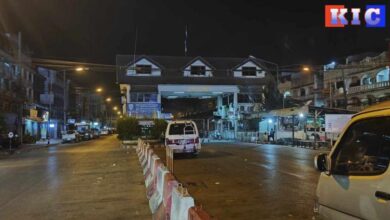“I would like to be the boat driver…”

S’Aik Klate’s, 9 years old, an ethnic Pwo Karen boy from War Khe Ma Township in Irrawaddy Division, is working at a cold drink shop in the village called “Gayan”. The village is not S’Aik Klate’s hometown, but he came to work there with his father and brother during the summer. The Pwo are one of the two main sub-ethnic groups of the Karen people.
Most of Gayan villagers are Pwo Karen – both Christians and Buddhists live in Gayan village, War Khe Ma Township. The village is made up of about 100 households; the families are farmers and orchard growers.
The people have to ride motorboat and then a ferry to get to Gayan village from Yangon – the trip takes six hours. First they have to ride the Irrawaddy trading ship from Maw Tin harbor in Yangon to Kyait Latt, Bogalay, Mawlamyaing Island. Next they ride a motorboat for three hours to get to the village. According to the passengers, the main trade route of Irrawaddy division is waterway.
Klate orders the stall owner to get cold sugar cane crunch juice for the guests in Burmese but with a strong ethnic Karen accent “Kyan Yay Aye Aye Lay”. Klate can’t speak fluent Burmese, nor does he often have to, as the vast majority of the local villagers speak in ethnic Karen.
Klate is barefoot and wears his school uniform; a green ‘longgyi’ now bleached to a discoloured white, his cheeks were covered with Thanatkha [Burmese suncream]. His friendly eyes close when he breaks into a broad grin. As a child, he often goes to play with other kids nearby the cold drink stall while there’s no customer and when his owner calls him, he runs to help out again. He is doing this to get pocket money during the summer. The salary is not based on daily basis and he helps the stall during the summer holidays and gets school fees in return when the school opens.
Klate and his brother S’Aik Sue Shar work hard as bean pickers during the school break to earn a little money to help cover their mother’s medical costs. Getting up at 4am each day, “If we pick beans a full sack that can contain 2 baskets [equivalent to 4 tins], we gets 500. If the beans are good, I and my brothers can pick up to 2 to 3 full sacks of beans. Then we earn 1000 to 1500 kyats daily (about $2). With that money we can buy medicine for mum.”
S’Aik Klate’s mother has to drag on her hip to move around since she took an injection of medicine that had long passed it’s expiry date – the contaminated medicine was administered by a local medic.
“Moe Moe [mum] is getting better now,” Klate says. “Moe Moe went to stay with her relatives back in the village. Since my father is a daily laborer for any available work, he comes to see us sometimes when he has time”.
Klate’s mum illness hit the family hard, the two brother were left to look after two of their four siblings, wile the others left to find money to help support the family. Klate’s five-year-old younger brother and three-year-old younger sister live with mother. His brother, S’ Aik Sue Shar 13, dropped out of school and started working to earn some money for the family.
Klate is about to enter his third year at the local primary school. His village has only has aprimary school and school children have to go to another village in order to attend middle school – it takes about one hour on foot to get there.
Nant Paung Bwar, a teacher from Gayan village said that it is common for children like Klate to be working during the school break to earn some money and help their parents.
“School children are just fair enough in studies. They give all the money to their parents that they earn during the holidays,” he says. “Some parents return some money back to their children to spend if there is special celebration in the village. Since most of the parents are poor, their children had to help them.”
There are only seven teachers in Gayan village, before Cyclone Nargis devastated Burma in 2010, one volunteer was hired to teach them Pwo Karen language during the summer time, but now they can’t hire the teacher anymore, according to teacher Nant Paung Bwar.
Customers who come to get a cold drink from Klate’s stall, often ask him whether he is happy at his work, when his school is opening, how many friends he has? He answers these questions easily and quickly, but when asked about whether he missed his mom, he replies only “yes” with his head down and his hands grasping his green longgyi.
As a small child, he misses his mom, and all those misses are temporarily replaced by playing with his friends in the local stream.
As the customers leave the stall, he gazes at them with folded arms. When people ask him “what would you like to do when you grew up?” He always answers simply with a smile; “I would like to be a motor boat driver.”




